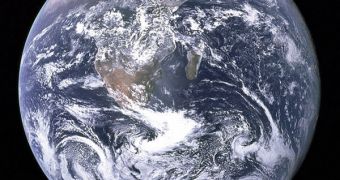The international scientific community has reignited an old debate as to whether life-supporting planets are common in the Universe, or if Earth is a unique place. The discussions were fueled by the discovery of the exoplanet Gliese 581g.
The extrasolar planet is located in close orbit around its parent star, the red dwarf Gliese 581, only some 20 light-years away from Earth.
It is most likely tidally locked to the star, meaning that it always keeps the same face oriented towards it. The Earth-Moon system is tidally locked as well.
But the real kicker about this planet is that astronomers who found it say that it exists in its star's habitable zone, which is the area where temperatures are just right to support liquid water.
According to estimates, average temperatures on Gliese 581g may oscillate between -4 and 71 degrees Celsius, which would definitely allow fir liquid water to exist on the surface of the planet.
Finding water in space is one of the main goals of exoplanetary research, experts explain, because the chemical favors the development of other molecules, which may eventually combine to create life.
With the new discovery, experts have again begun wondering if planets such as our own may exist in the Universe, or if we are indeed a fluke, and a one-in-a-million chance that came true.
“Any planet is unique in its details, but what we're really asking is: are the general properties of Earth something we can expect to be common in the galaxy, or rare?", explained Neil deGrasse Tyson.
The astrophysics expert is the director of the American Museum of Natural History's (AMNH) Hayden Planetarium. He participated at a meeting this Sunday, October 10, which sought to discuss the possibility of extraterrestrial life.
“On Earth, where there is liquid water, there is life. So, water is a tantalizing tag for us as we conduct our search for life in the Universe,” the scientist said, referring to the newly-found exoplanet.
Participants acknowledged the importance of other factors as well, that play critical roles in allowing for life to exist on our planet.
Plate tectonics, volcanism, earthquakes, a solid planetary core and a fluid mantle are all factors that contribute to sustaining a stable atmosphere, and allowing life to thrive here.
“Tectonics stopped on Mars and it lost its atmosphere,” said Rutgers University professor of geological and marine sciences Paul Falkowski, who was also a panel member.
“On Venus, it's much too hot for life to exist as we know it. Earth is the only one in the so-called habitable zone,” the expert added, quoted by Space.
Speaking about the possibility of finding life elsewhere in the Universe, the scientist said “I'm much more optimistic that, in my lifetime, we're going to know the answer to, 'Are we alone?' [before we know] the origin of life.”

 14 DAY TRIAL //
14 DAY TRIAL //